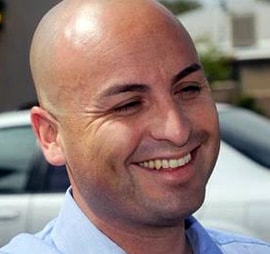
Hector Balderas (Courtesy photo)
Democratic U.S. Senate candidate Hector Balderas was a college dropout working on an assembly line at 21. Like so many others who find their way out of poverty, his story is filled with people who challenged him and gave him hope for a better life.
This is the second of four profiles of the U.S. Senate candidates that seek to tell the stories of who they are and what shaped them.
At age 21, Hector Balderas was a college dropout working the graveyard shift at a Motorola assembly plant in Albuquerque. He was in debt. He wanted a family. And he was tired of getting off work in the middle of the night and eating at Village Inn.
At that critical juncture in his life, Balderas, now a Democratic U.S. Senate candidate, decided to quit his job, move back to Las Vegas, N.M. and re-enroll at New Mexico Highlands University.
Balderas was deficient in reading and writing. He had struggled during his first attempt at college and earned poor grades, he told NMPolitics.net. The second time he had to do remedial work and re-take courses.
But he did the hard work, and from that point on, Balderas has been on a different path.
He earned a bachelor’s degree from Highlands. He went to law school in Albuquerque. He completed an internship at the U.S. Department of Agriculture in Washington, D.C. He was elected to represent his hometown of Wagon Mound and surrounding communities in the state House. In 2006, he was elected state auditor.
When he became auditor at age 33, Balderas was the youngest statewide Hispanic elected official in the nation. He was named one of the nation’s most 100 influential Hispanics.
For a man who grew up in poverty in a rural town with a few more than 300 residents, such success may have been improbable. He claims in his new TV ad to be the first person from Wagon Mound to become an attorney. Today he lives in Albuquerque with his wife and three children.
Like so many others who find their way out of poverty, Balderas’ story is filled with people who challenged him and gave him hope for a better life.
‘Taking it to’ college-bound students in chess
Balderas and his two younger siblings were raised by their mother, with the help of public housing and food stamps. Dessert was a can of peaches. A soda and bag of chips were a treat once or twice a month.
He described his father, a Mexican national, as a “vagabond” who wasn’t around much during his early years and “totally gave up on being a father influence” when Balderas was 11 – though they now talk on the phone a few times a year.
He said his grandfather on his mother’s side was one of his early influences – a harder worker who was “optimistic, resilient and humble.”
Asked to share stories about people and moments that set him on a different trajectory, Balderas started with his seventh-grade science teacher, Mr. Padilla, who taught his students to play chess.
The students were fine with that, thinking it was a way to get out of studying. It turned out the team from Wagon Mound was good. Balderas described them as “a bunch of little Hispanics in a station wagon” driving around Northern New Mexico and “really taking it to” college-bound students from St. Michael’s in Santa Fe, St. Pius X in Albuquerque and Los Alamos.
Wagon Mound won the state championship that year and went to nationals, which happened to be in Albuquerque. That instilled some confidence in Balderas and got his competitive juices flowing.
A coach who helped buy shoes
A couple of years later, Balderas wanted to join the basketball team. But the shoes cost $65, and he knew his mom didn’t have the money. Balderas described having “limited coping skills” and giving up – an automatic reaction during his childhood.
“Poverty is more than just…” Balderas said before trailing off for a moment. “There’s an identity challenge with it. There’s stigma. There’s emotional insecurity. And then there’s just isolationism, where you don’t fit in in school and don’t know where you fit in anywhere in the world. I battled that.”
Then came one of those amazing moments in Balderas’ life. Coach Marquez bought the shoes for him and told him to repay the money in $5 monthly installments. That created “a monthly anxiety” for a teen who had little cash, and some shame that he needed the loan, but, Balderas said, “I wanted to play so bad.”
After Balderas made three successful payments, Coach Marquez canceled the remaining debt. And Balderas got to play basketball.
“It sounds so cliché, but it really isn’t. Basketball, the opportunity to compete, changed my life,” he said. “It was one of the first times where I socially felt like I was developing confidence.”
A ride to Boys State
Soon thereafter, Mary Schutz, the school’s principal, told Balderas he had been nominated to attend New Mexico Boys State, a summer leadership and citizen program that teaches high school students about the importance of participating in government. He thanked her, then planned to drop the issue. His mother could not afford to send him to New Mexico Military Institute in Roswell, where the event was held that year.

But Schutz and her husband, whose son had also been nominated, offered to drive Balderas. So he went.
“There I was in the dorms, realizing that it was quite an honor to go, and there were a lot of other talented students from all over the state,” Balderas said. “It was then I started thinking I could go to college.”
To that point – he was 15 or 16 – Balderas said he had been a “welfare kid” who wore hand-me-down clothes donated by the local Church of Christ. In a high school with only a few dozen students, “the kids know you’re wearing their clothes,” he said.
“So being the food-stamp kid, it was very shameful those early teen years – but then I began to develop confidence from Boys State, playing basketball,” he said.
Becoming a ‘more reliable’ worker
Life started to change after that. Balderas said he became a “more reliable” worker and started getting jobs working on ranches around Wagon Mound and at the local gas station.
“They’d give me $20 to unload a semi and buy me a burger, and I thought I won the lottery,” Balderas said. “They noted they couldn’t get that kind of work ethic out of their kids.”
Hearing such praise, Balderas said, further built his confidence.
Among the ranchers who employed him was Bill Seidman, a former head of the U.S. Federal Deposit Insurance Corporation in Washington and an economic adviser to three Republican presidents.
Balderas recalls talking with Seidman about what it was like to work for a president. And he realized he was having a conversation with someone who had been hugely successful – and that he, a teen from Wagon Mound, could have such conversations with successful people.
Balderas called it “One of the first positive experiences that I had with someone in both government and business.”
‘There are no throwaway schools’
All of that set Balderas on a path to Highlands in Las Vegas, but he wasn’t ready during his first attempt. So he ended up in Albuquerque working on an assembly line next to Evelyn, a mother who worked graveyard shifts so her daughter would never have to. One night, Evelyn challenged Balderas to go back to college.
“At that moment, I realized that I was not only letting Evelyn down, but that to honor my mother’s and grandfather’s struggles – and all the other people from Wagon Mound who believed in me – I needed to go back to college and make a substantial contribution to the community that did so much for me,” he said.
Balderas moved back to Las Vegas, got a job at a grocery store, and, the second time around, succeeded in college. Highlands, Balderas said, is a school with open enrollment that “will take you back if you flunk out,” so some call it a “throwaway school.” Growing up, he believed he was attending “throwaway schools,” including Highlands.
It’s not true, he said.
“There are no throwaway schools. Reputation is overrated,” Balderas said. “If institutions convince students to make the most of it, you can have a wonderful education.”
Balderas is determined to make less-prestigious K-12 schools and colleges better. He said that’s why, when the auditor’s office learned of potential embezzlement in the Jemez Mountain School District, he pushed so aggressively to get to the bottom of it.
His office’s 2009 audit uncovered more than $3 million in embezzlement and helped lead to criminal charges.
Balderas said “bureaucrats” had ignored complaints about financial mismanagement in the school district for years, and his desire to intervene stemmed from a deep belief that such schools can be better.
Staking job performance on ‘real outcomes’
Balderas believes such waste, fraud and abuse is rampant in government, and speaks impatiently about politicians in Washington who battle over budget cuts and tax increases instead of addressing real problems.
“I don’t think it’s enough just to blame the other side any more,” Balderas said. “I don’t think that congressional leaders who are blaming the other side are serving the interests of the public.”
He cited the recent corruption scandal in Sunland Park and the fact that some residents of the tiny town of Columbus get their water through a spigot at city hall as consequences of ineffective government.
“Corruption and poverty are the unfortunate results,” he said. “The citizen who is suffering is a victim of a lack of innovation and cooperation.”
Balderas promises to be a different U.S. senator – one who helps bring local, state and federal governments, and nonprofits, together to more efficiently and effectively build better communities.
“As a senator I feel a certain responsibility in oversight,” Balderas said. “The highest-paid, most influential leaders in New Mexico should take responsibility for the lack of progress in some areas of New Mexico.”
“Very few lawmakers are wiling to stake their job performance on real outcomes like the job rate, the poverty rate – and I’m willing to do that as a U.S. senator,” Balderas said, adding that, if he’s elected and those numbers don’t improve during his first term in office, “then I’m willing to come home.”